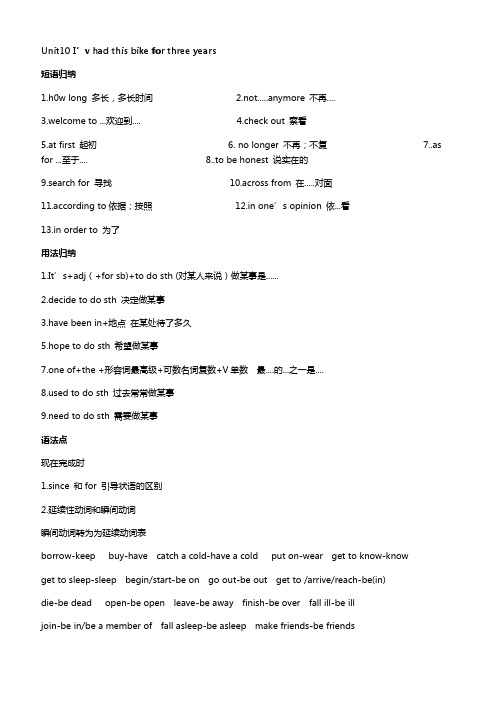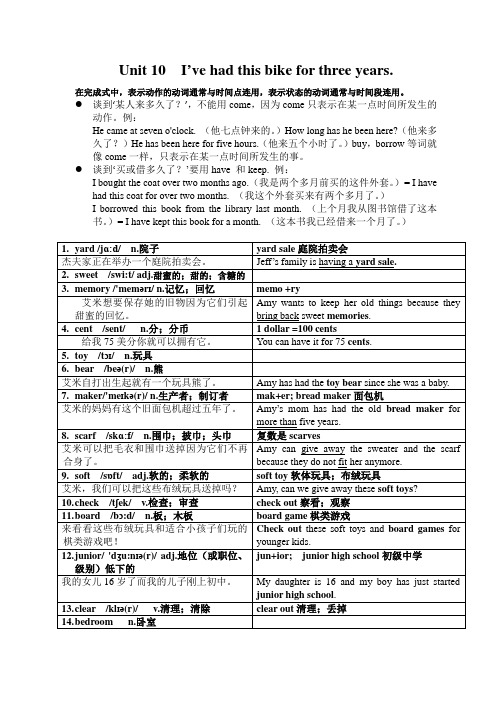人教版八年级下册英语第10单元知识点梳理!
完整版人教版英语八年级下册unit10知识点总结

完整版人教版英语八年级下册unit10知识点总结完整版人教版英语八年级下册Unit 10知识点总结Unit 10 of the complete edition of the People's Education Press English textbook for eighth grade covers various topics related to travel and tourism. This unit introduces new vocabulary, grammar concepts, and practical language skills that are useful for students in their daily conversations and written expressions. Below is a comprehensive summary of the key points covered in this unit.1. Vocabulary:- Words and phrases related to travel: journey, trip, travel, tourist, guide, accommodation, sightseeing, etc.- Words related to transportation: flight, train, bus, ship, subway, taxi, etc.- Words related to tourist attractions: museum, park, zoo, beach, mountain, etc.2. Grammar:- Present continuous tense: Used to talk about actions happening at the moment of speaking or temporary situations. Formed by using the present tense of "be" (am, is, are) + verb (-ing).- Examples:- I am traveling to Beijing next week.- They are visiting the Great Wall of China.- We are staying at a hotel near the beach.- Comparative and superlative forms: Used to compare two or more things. "Comparative" is used to compare two things, while "superlative" is used to compare three or more things.- Examples:- The Eiffel Tower is taller than the Statue of Liberty.- Mount Everest is the highest mountain in the world.- Prepositions of place: Used to indicate the location or position of something. Common prepositions of place include in, on, at, under, behind, etc.- Examples:- The car is parked in front of the building.- The book is on the table.- The cat is hiding behind the sofa.3. Reading and Listening Skills:- Understanding and answering questions about travel brochures, advertisements, and itineraries.- Listening to dialogues and conversations related to travel plans, transportation, and directions.4. Writing Skills:- Writing a travel diary or a blog post about a recent trip. Includes describing the destination, activities, and personal experiences.- Writing a postcard or letter to a friend, sharing details about a visited place and expressing thoughts and feelings.5. Speaking Skills:- Role-playing dialogues about making travel plans, booking accommodations, asking for directions, etc.- Group discussions on favorite tourist attractions, dream travel destinations, and travel experiences.6. Cultural Knowledge:- Learning about famous tourist attractions around the world.- Exploring different customs and traditions in various travel destinations.By studying and mastering the knowledge points in Unit 10, students will be able to effectively communicate and express themselves in English when discussing travel-related topics. Practice and application of these points will enhance students' language proficiency and broaden their understanding of the world.。
人教版八年级下册英语Unit 10 知识点语法归纳总结

Unit 10 I’ve had this bike for three years.1.短语归纳2.典句必背3.用法集萃(1)How long have you had that bike over there? 你买那边的那辆自行车多长时间了?❖本句是how long引导的特殊疑问句,时态是现在完成时,结构是“How long+have/has+主语+过去分词+其他?”。
how long表示“多长时间”,对时间段进行提问。
例:—How long have you lived in Beijing?—For ten years. 十年了。
辨析:how often, how soon, how long, how far(2)Because I’ve had it since I was a baby. 因为我还是个婴儿的时候就拥有它了。
❖since是连词,意为“自从;...以来”,引导时间状语从句,从句多用一般过去时,主句多用现在完成时。
例:He has skated for quite some time since we came here. 自从我们来到这儿,他已经滑冰很长时间了。
She has been living a hard life since her husband died. 自从她丈夫死后,她一直过着艰苦的生活。
❖拓展since还可以用作介词,后接名词或名词短语。
例:He’s been off work since Tuesday. 自星期二以来他一直没上班。
(3)For example, he has owned a train and railway set since his fourth birthday, and he played with italmost every week until he was about seven.比如,他从四岁生日起就拥有了火车和铁路套装玩具,他几乎每个星期都玩儿它,直到他七岁左右。
人教版八年级下册英语Unit10知识点总结

Unit10 I’v had this bike for three years短语归纳1.h0w long 多长,多长时间2.not.....anymore 不再....3.welcome to ...欢迎到....4.check out 察看5.at first 起初6. no longer 不再;不复7..as for ...至于....8..to be honest 说实在的9.search for 寻找10.across from 在.....对面11.according to依据;按照12.in one’s opinion 依...看13.in order to 为了用法归纳1.It’s+adj(+for sb)+to do sth (对某人来说)做某事是......2.decide to do sth 决定做某事3.have been in+地点在某处待了多久5.hope to do sth 希望做某事7.one of+the +形容词最高级+可数名词复数+V单数最....的...之一是....ed to do sth 过去常常做某事9.need to do sth 需要做某事语法点现在完成时1.since 和for 引导状语的区别2.延续性动词和瞬间动词瞬间动词转为为延续动词表borrow-keep buy-have catch a cold-have a cold put on-wear get to know-knowget to sleep-sleep begin/start-be on go out-be out get to /arrive/reach-be(in)die-be dead open-be open leave-be away finish-be over fall ill-be illjoin-be in/be a member of fall asleep-be asleep make friends-be friendsCome/go-be+相应的介词close-be close go to bed-be in bed get up-be up。
最新八年级英语下人教版第十单元知识归纳

八年级英语下人教版第十单元知识归纳Unit 10 I’ve had this bike for three years.一、重点短语1.yard sale 庭院拍卖会2.board game 棋类游戏3.check out 察看;观察4.no longer 不再,不复5.to be honest 说实在的6.according to 依据,依照7.in one’s opinion 依......看8.a couple of 两个,几个9.as for 至于,关于10.once a year 一年一次二、语法难点现在完成时常与“for+时间段”或“since+时间点”连用。
1.for 作介词,后接时间段,表示“某个动作持续了多久。
Eg:I’ve been here for just over two years. 我来到这儿刚好两年多了。
2.since 可作介词,后接时间点,也可用作连词,后接从句,表示某个动作或情况从过去某一时间点一直持续到现在,从句用一般过去时。
Eg:He’s been here since two years ago. 他两年来一直住在这儿。
注意:for 和since引导的时间状语不能与终止性动词的肯定式连用,但可和其否定式连用。
Eg:Mr Smith hasn’t come to China for three years. 史密斯先生三年没来中国了。
I haven’t seen him since I came back. 自从我回来就没见过他。
针对性训练:用for 或since填空1.She has been ill ________ more than to two weeks.2.I haven’t met him __________ a long time.3.Mary has been here ___________ eight o’clock this morning.4.It hasn’t rained ____________ two months ago.5.They have been my friends _________I was a child.三、高频考点1.check out意为”价差;审查”,为动副结构,是及物动词短语。
Unit 10知识点讲解人教版英语八年级下册

Unit 10 I’ve had this bike for three years.
在完成式中,表示动作的动词通常与时间点连用,表示状态的动词通常与时间段连用。
●谈到‘某人来多久了?’,不能用come,因为come只表示在某一点时间所发生的
动作。
例:
He came at seven o'clock. (他七点钟来的。
)How long has he been here?(他来多久了?)He has been here for five hours.(他来五个小时了。
)buy,borrow等词就像come一样,只表示在某一点时间所发生的事。
●谈到‘买或借多久了?’要用have 和keep. 例:
I bought the coat over two months ago.(我是两个多月前买的这件外套。
)= I have
had this coat for over two months. (我这个外套买来有两个多月了。
)
I borrowed this book from the library last month. (上个月我从图书馆借了这本
书。
)= I have kept this book for a month. (这本书我已经借来一个月了。
)。
Unit 10 单元知识点总结课件-八年级英语下册(人教版)

make friends be friends
go out be out
finish be over
Get to/arrive/ reach be in
leave be away(from) join be a member of/ be in
come/ go 相应的介词短语
瞬间动词 (组)转换为 “be+ adj./ adv./prep./
01
1. 现在完成时用法总结 • 表影响:动作发生在过去并且对现在造成影响
I have already finished my homework.
• 表持续:动作发生在过去持续到现在(谓语动词必须时延续性动词)
I have kept the book since 5 days ago.
2.瞬间Vs. 延续性动词
01 How long
询问物体长度 “多长”
回答:It’s + 长度;About+长度
—— How long is the river? —— It’s About 500 kilometers.
询问时间长度 “多长时间”
回答:for+时间段(for常省略); since+过去时间点/ 时间段+ago/过去时间状语
表示能够延续的动作或状态
• 常与表示时间段的状语连用 延
(for+一段时间, since+从句/时间 续
点, how long)
性
动
• 常见延续性动词
词
learn, read, work, walk, wait…
I have waited for 2 hours.
表示动作是瞬间完成的
人教版八年级下册英语Unit 10单元语法知识点总结
人教版八年级下册英语Unit 10单元语法知识点总结本单元重点短语的具体用法1. "These days":表示目前或现在的情况。
例如:These days, more and more people are using mobile phones.(现在,越来越多的人使用手机。
)2. "Regard with great interest":表示以极大的兴趣关注着。
例如:I always regard with great interest the development of technology.(我总是以极大的兴趣关注着技术的发展。
)3. "In order to":表示目的。
例如:She studies hard in order to get good grades.(她努力学习是为了取得好成绩。
)4. "So far":迄今为止,到现在为止。
例如:So far, we have learneda lot of new knowledge.(到目前为止,我们已经学到了很多新知识。
)5. "In need":需要。
例如:We should help those in need.(我们应该帮助那些需要帮助的人。
)6. "Not...anymore":不再......例如:He doesn't play basketball anymore.(他不再打篮球了。
)7. "Welcome to sp.":欢迎来到......例如:Welcome to our school.(欢迎来到我们学校。
)8. "Check out":察看、观察。
例如:Let's check out the new restaurant.(我们去看看那家新餐厅吧。
人教版八年级下册英语Unit10知识点
人教版八年级下册英语Unit10知识点Please keep a seat for me. = Please keep me a seat. 请给我留个座位。
2、in need 在困难时;在危难之中be in need of 需要……We are raising money for children in need. 我们在为贫困儿童募捐。
A friend in need is a friend indeed. 患难见真情。
After working for ten hours, she was in great need of rest. 工作十小时之后,她非常需要休息。
in短语:in danger 在危险中in trouble 在困境中in order 井然有序in hand 在手头;在控制中2、check 检查;审查check in (在旅馆、机场等)登记check out 察看;观察You should check your answer before you hand in your paper. 在你交卷子前你应该检查答案。
You should check in before the flight. 飞机起飞前你应该登记。
If you find something interesting, I will check it out. 如果你发现什么有趣的东西,我会去看一下。
3、junior high school 初中high school 高中4、no longer = not……any longer不再;不复This kind of skirt is no longer in fashion. = This kind of skirt is not in fashion any longer. 这种裙子不再流行。
He no longer lives in the city. = He doesn't live in the city any longer. 他不再住在这个城市了。
八年级英语下人教版第十单元知识归纳
Unit 10 I’ve had this bike for three years.一、重点短语1.yard sale 庭院拍卖会2.board game 棋类游戏3.check out 察看;观察4.no longer 不再,不复5.to be honest 说实在的6.according to 依据,依照7.in one’s opinion 依......看8.a couple of 两个,几个9.as for 至于,关于10.once a year 一年一次二、语法难点现在完成时常与“for+时间段”或“since+时间点”连用。
1.for 作介词,后接时间段,表示“某个动作持续了多久。
Eg:I’ve been here for just over two years. 我来到这儿刚好两年多了。
2.since 可作介词,后接时间点,也可用作连词,后接从句,表示某个动作或情况从过去某一时间点一直持续到现在,从句用一般过去时。
Eg:He’s been here since two years ago. 他两年来一直住在这儿。
注意:for 和since引导的时间状语不能与终止性动词的肯定式连用,但可和其否定式连用。
Eg:Mr Smith hasn’t come to China for three years. 史密斯先生三年没来中国了。
I haven’t seen him since I came back. 自从我回来就没见过他。
针对性训练:用for 或since填空1.She has been ill ________ more than to two weeks.2.I haven’t met him __________ a long time.3.Mary has been here ___________ eight o’clock this morning.4.It hasn’t rained ____________ two months ago.5.They have been my friends _________I was a child.三、高频考点1.check out意为”价差;审查”,为动副结构,是及物动词短语。
Unit10单元必背知识点人教版八年级英语下册
10单元必背知识点1.memory —— (复数)memor ies2.make —— (名词)maker3.clear —— (副词)clear ly4.own —— (名词)own er5.honest an honest boy honest —— dis honest(否定词)6.truth —— (形容词)truth ful7.among 三者或者三者以上之一、或者中间8.regard….as 把看……做9.century —— (复数)centur ies10.especial —— (副词)especial ly11.consider doing sth12.hold —— (过去式)held ——(过去分词)held13.how long 与段时间连用必须用延续性动词buy----have borrow---keeplearn how to ride a bike 学校怎样骑自行车特殊疑问词做宾语14.scarf——(复数)scar ves/scarf s15.give away捐出a couple of months 几个月16.child——(复数)child ren17.need to do sth18.越来越...the+比较级...,the+比较级.....多音节形容词或副词more and more....-er and -er如warmer and warmer,colder and colder19.decide ——(名词)deci siondecide to do sth决定做某事20.keep doing sth/keep adj21.ninth twent ieth twel fth22.either用于否定句,表示也either...or或者...或者either还表示2者中的一个23.more understand ing24.give up doing sthe—— use ful26.比较级标志词much,even, thanhave/has +动词过去分词与for+ 一段时间连用或者since +过去的某一时间点(since +一般过去时态句子)27.feel——(名词复数)feel ings28.live——(形容词)a live(adj) sleep---(形容词)a sleepwake---(形容词)a wake29.leave sth somewhere 把某物忘在某地30.an eight-year-old boy中间有连字符做定语31.find sb doing sth/find it +adj for sb to do sthed to do sth过去常常做某事be used to doing sth习惯做某事,to是介词,be used to do sth表被动,被用来做某事33.regard...as把....看做34.appear dis appear消失35.take place发生,没有被动语态36.ride——rode—— ridden37.be shameful to do something 做某事感到羞愧38.consider doing思考做某事39.how long与段时间连用,单词是延续性动词如:How long have you had it?How long have you been here?40.It's hard to do something做某事困难41.How much is it?多少钱?42.She has had it for three years.for+段时间现在完成时态的标志43.He has been here since ten years ago. since +过去时间现在完成时的标志44.get /become后面加形容词45.not .....until直到...才46.I've had this book for three years.现在完成时have/has +过去分词for+段时间现在完成时态的标志since +一般过去式since +过去时间....ago47.语法点:现在完成时since和for引导状语的区别&延续性动词和瞬间动词--How long have you had the bike over there? --I have had it for three years.--Why? It's so old. -Because I have had it since I was a baby.48.in one's opinion 依.….看49.according to依据:按照50.in order to 为了51.people in need 有需要的人52.do with处理53.even though 即使lion s of数以百万计的55.during the summer holiday 暑假期间。
- 1、下载文档前请自行甄别文档内容的完整性,平台不提供额外的编辑、内容补充、找答案等附加服务。
- 2、"仅部分预览"的文档,不可在线预览部分如存在完整性等问题,可反馈申请退款(可完整预览的文档不适用该条件!)。
- 3、如文档侵犯您的权益,请联系客服反馈,我们会尽快为您处理(人工客服工作时间:9:00-18:30)。
人教版八年级下册英语第10单元知识点梳理!
Unit10 If you go to the party, you’ll have a great time!
【重点词语/短语用法解析】
1. have a great time 意为“玩得愉快”,=enjoy oneself, have fun, have a good / wonderful / nice time
have a great / good time in (doing) sth. 做某事很开心
2. ask sb.(not)to do sth. 要求某人(不)做某事
The teachers ask us to do (do) lots of homework.
3. order sth. from +地点“从某地订购食物”
I want to order some books from the book store.
4. keep…to oneself 保守秘密
5. unless conj. 除非;如果不
unless 引导的条件句表示在特定条件下,才决定做或不做一件事。
=if...not
The concert will be held as schedule unless there is a typhoon.= The concert will be held as schedule if there is not a typhoon.
6. be afraid to do sth. 害怕干某事
I’m afraid to speak in front of other people.
be afraid of sth. 害怕某事
He told me not to be afraid of difficulties.。
